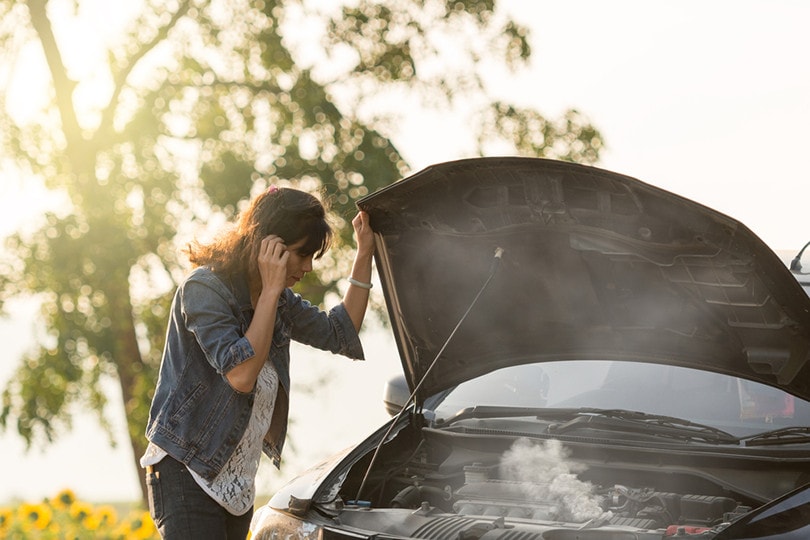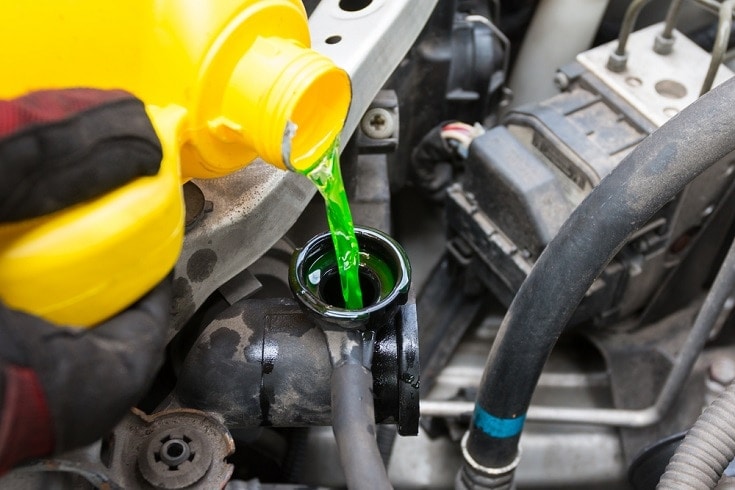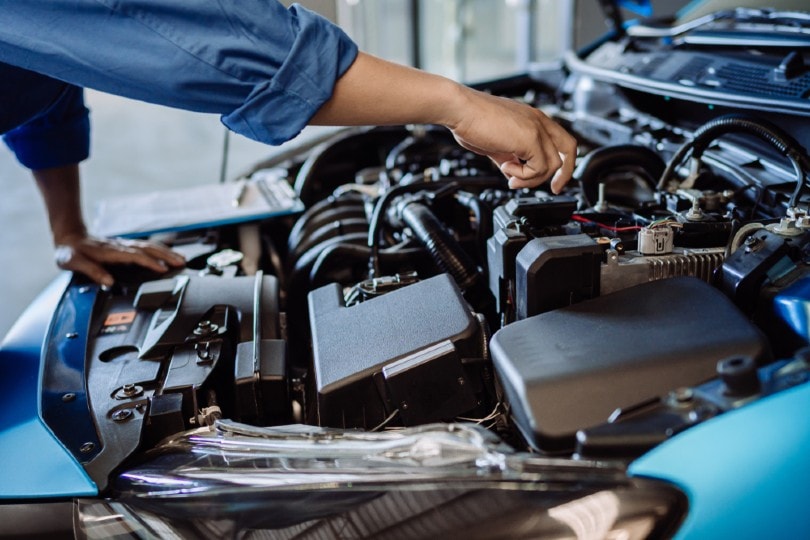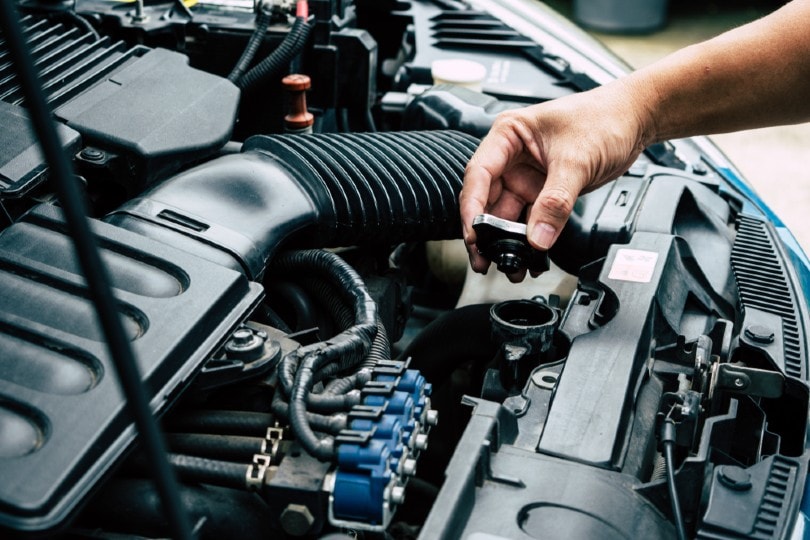Why Is My Car Overheating? 7 Possible Reasons
-
Ed Malaker
- Last updated:

If your car is overheating, it can cause considerable engine damage, so it’s important to locate the cause and repair it. While the best option is to take it to a qualified mechanic to get it properly diagnosed, figuring out the cause yourself can help you prepare for the cost of getting it fixed. You may even be able to fix it yourself in some cases. If you want to figure out why your car’s overheating, keep reading, as we provide you with several reasons that it might be occurring and what it will take to fix it.
Why Is My Car Overheating? (7 Reasons)
1. Low Engine Coolant

Your engine relies on coolant moving through the radiators so they can stay cool and operate properly. If there isn’t enough coolant in the system, it won’t be able to cool the engine quickly enough, and you will start to see the temperature rise. If the coolant is very low, the temperature can rise quickly, putting the engine in danger.
How Can I Fix It?
Most modern cars have a computer system that monitors the coolant level at all times and will tell you immediately when it is low. So, it’s not likely that low fluid will be a problem unless you have an older car. In any case, fixing this problem only requires you to add coolant to the reservoir until full. The reservoir is usually a plastic container near the radiator with a marking telling you when it’s full. If you are unsure how to read it, check your owner’s manual.
2. Coolant Leak
If you notice that your engine coolant frequently needs refilling, you likely have a leak in the system. In rare cases, a faulty radiator cap or a hole in the reservoir can allow water to escape. However, a problem with the rubber hoses is the most common. These hoses can wear out, especially if you drive hard, and start to leak. You can usually smell a coolant leak because antifreeze has a unique scent.
How Can I Fix It?
If you think that you have a coolant leak, you will need to track it down and repair it. If it’s the radiator cap, it’s easy to get a replacement, but if it’s a hose, we recommend taking it to a qualified technician unless you have experience in this area. Improperly changing the hose can make the problem worse and put more strain on the engine.
3. Bad Water Pump or Belt

One thing that can cause your car to overheat is a bad water pump. If the water pump is bad, the vehicle will quickly overheat because no antifreeze is moving through the system. You likely won’t notice any odor until the car overheats because no coolant is leaking. The water pump is a simple device that your serpentine belt operates. If this belt brakes, it will stop moving coolant, which will cause the car to overheat. However, you will likely notice several other problems, like difficulty steering and a dead battery. In some older cars, a separate belt runs the pump and can break without affecting steering, but it’s not common in modern vehicles.
How Can I Fix It?
If either the water pump or the belt breaks, you will likely need the help of a qualified technician to repair them. It can be hard to reach the water pump on some vehicles, and it can be difficult to figure out how to install the serpentine belt if you don’t have experience.
4. Broken Fan
One common reason that modern cars overheat is that the fan isn’t operating properly. In some cases, the fans motor can burn out, but more frequently, it’s a problem with the car’s internal computer system. This system monitors the engine’s temperature and operates the fan when temperatures get too high. However, if there is a problem with the code, the fan might not turn on, enabling the car to overheat. You may also notice other strange occurrences when the fan control is not operating correctly. For example, the fan might suddenly turn on full blast when the engine temperature isn’t high.
How Can I Fix it?
Whether the fan breaks or there is a computer problem, the best way to fix it is to take it to a qualified technician. Both jobs require special skills and tools that many people don’t have, and fixing the problem the wrong way might make it worse.
- See Also: Why Do NASCAR Cars Have Fake Headlights?
5. Clogged Radiator

Clogged radiators are quite rare because the cooling system is closed, and there is no way for contaminants to enter. However, radiators do get clogged on occasion, and since the coolant can’t move through the system correctly, the vehicle will likely begin to overheat.
How Can I Fix It?
A clogged radiator is a problem to take to a qualified technician. They may have the tools that can flush out your system to help get the coolant moving freely. Otherwise, they will need to replace the radiator, so you want someone who knows how to do it correctly.
6. Bad Thermostat
All cars have a built-in mechanical thermostat that tells the car when it’s time to start circulating the coolant to keep the engine cool. If this component malfunctions, it can prevent the coolant from circulating, causing the engine to overheat.
How Can I Fix It?
The best way to diagnose and fix a bad thermostat is to take it to a qualified technician who has the tools to test the component and change it if necessary.
7. Heavy Strain

One thing that can cause your vehicle to overheat frequently is pulling or carrying too much weight. The additional strain will cause the engine to work harder, which will create more heat. If towing a heavy load creates too much heat, the engine coolant and radiator may not be able to keep the temperature within an acceptable range, and the car will overheat.
How Can I Fix It?
The best way to prevent the car from overheating under heavy strain is to reduce the strain. The owner’s manual is usually a good place to find out how much weight your car can transport safely without causing the car to overheat.
What Do I Do If I Notice My Car Is Overheating?
We recommend shutting off the car immediately and giving it time to cool if you see the temperature rise above its normal position. Any sudden increase in temperature suggests a problem with the cooling system. Even if the car doesn’t overheat, it’s important to look it over to see if there are any leaks or other problems. If you notice an issue, it is important to get to a mechanic immediately to have it repaired. If you can’t make it to the garage without the car reaching a high temperature, you may need to call a tow truck for help.
Summary
The most likely cause of an engine overheating in modern cars is the computer improperly controlling the fan, causing it to come on too late or preventing it from operating. A broken fan motor, a bad thermostat, or a malfunctioning water pump are also quite common. If you smell antifreeze or notice a higher-than-normal temperature reading on your dashboard, it’s time to make an appointment with a mechanic to check the car for problems.
Featured Image Credit: worawit_j, Shutterstock
Contents
